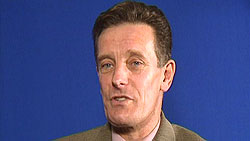 |
| Major John Rogerson |
Life on the troopship, below deck, was very hard because although we no longer used hammocks, we had these bunk beds, which were 5 high. And in very rough weather, if you were living on the bottom bunks and 4 of your colleagues above you were seasick, you can imagine what it was like, catching it at the bottom. I never stayed below very long because I found it was even worse staying below. So I used to go up on top as much as I could, get a lot of fresh air. But I also used to play a lot of three-card brag and one of my claims to fame is that we were the only school left, going round the Bay of Biscay. Everyone else was below being sick. We had such a big school and so much money left on the table that we didn’t notice it was rough, and so we carried on playing our three-card brag until the storm was over. Another aspect [of the] social life was that the regimental band used to play regularly in the bar at night, and we used to have great fun and games there because there was nothing, not a lot to do. Although we did a lot of our ‘room jobs’, if you like, on the deck, organised by the ship’s crew, and we used to have to scrub the decks and do the various things like that. We did exercises and all the other things that the officers tried to keep us occupied, in between their social activities and mess nights. We also, at ports, we used to bring on board a man called the Gully Gully Man, particularly in Suez. He was a magician and I was fascinated how he used to take half crown pieces off people in the audience and just go to somebody’s ear and produce a one-day-old chicken from the half crown. That always used to fascinate me. Another pastime was that, during the trip through the Suez Canal, the Walla Walla boats used to come alongside and throw up a big ball of raffia, which had a rope on the end and a basket in the middle, and in the basket were electrical goods, watches and various things like that. And the ploy was that the soldiers used to take the watch, throw the raffia ball back down and not put any money into the thing. And some of the incensed Walla Walla men used to climb up and get on board, and on one occasion, one of them was thrown overboard because they wouldn’t give him his money. So it was quite interesting, and as a young man in those days, I found it all very fascinating.
I then was tasked to run the 432 heat trials in a place called [Bir Fukum] on the Little Aden Peninsula. And we were given these two prototype 432s, having never even seen them and never driven them before, and we had to drive them for 10 hours a day in the desert. And I had three national servicemen with me, and I’ve soon caught up with one of them. And we drove, two of us drove for 5 hours in the morning, kept them running over lunchtime, and the other two drove for 5 hours in the afternoon. And it was amazing; we went out on the salt flats for miles away from base, with no telecommunications or anything. And I recall one time, we broke down, and I was on my own, the other one was elsewhere. And I completely broke down, couldn’t get the thing started. And I remembered seeing an Aden Protectorate Levy patrol further back, so I grabbed my goatskin water bottle and I marched back, following the tracks back to where I’d seen this patrol and I actually found them in the desert. There was two SAS men with them and they organised two four-tonners to come and tow me and give me a bump start and I got going again. But that was quite frightening, being on your own.
Once we had completed heat trials on the vehicles, we then had troop trials. And we drove around in 135 degrees fahrenheit in the shade, battened down with the troops in the back. The night before, we’d built two assault courses, identical, so that the boffins who were out testing the troop trials could monitor the performance of these people who’d driven around in these vehicles for two hours, battened down in the heat. We drove up, reversed up to where we’d built these assault courses the night before, open the doors, and the troops were running down this complete flat piece of sand, whooping and screaming and hollering, saying “This is the easiest assault course we’ve ever been on!” Because the Arabs had stolen the lot, barbed wire and all! So it was quite an amusing incident. We had to stop the trials and rebuild and guard the assault courses overnight whilst we did the trials again.